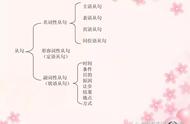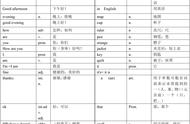01
宾语从句
一、定义
在句子中起宾语作用的从句叫做宾语从句。
二、连接词
that: I think that you can pass the exam.
Whether/if: I don’t know what the word means.
“Wh”: I don’t know what the word means.
I don’t know where he found the book.
只用whether的情况:
1. 与or not连用:
I don’t know whether it’s raining or not.
2. 与动词不定式连用:
He doesn’t know whether to accept the invitation.
3. 连接词前有介词时:
It depends on whether he is coming.
三、时态
1. 主句是一般现在时态,从句根据实际情况而定(各种时态均可)
She wants to know what he has done for the exam.
2.主句是一般过去时态,从句用相应的过去的时态。
She said that she was a student.
She said that she would fly to Japan in a week.
She said that she had finished her homework already.
3. 如果宾语从句说的是客观真理、自然现象或事实时,这时宾语从句要用一般现在时态。
The teacher said that the earth goes round the sun.
02
定语从句
一、定义
在复合句中修饰名词、代词的从句叫定语从句。
二、先行词
先行词指人 who /that
先行词指物 which/ that
定语从句一般紧跟被修饰的名词或代词(即先行词)后
三、关系代词
关系代词代替先行词在句子中担当成分,所以从句中不可再出现其他代替先行词的代词
四、翻译方法 “…. 的”
Whom: 先行词指人,则代替先行词在定语从句中充当宾语(包括介词的宾语),与who的区别是如果前面带介词则必须用whom
1. This is the teacher whomwho we like best.
2. I don’t like the boy to whom you are talking.
Whose : 指人或物,作定语,表示 “…的”
eg: Harry is the boy whose mother is our math teacher.
关系代词只能 that 的特殊情况:
1.先行词前有序数词修饰时:
This is the first gift that my parents bought me.
2.先行词前有形容词最高级修饰时:
This is the most exciting film that I have ever seen.
3. 先行词是不定代词something, anything等时.
e.g. Is there anything that you want in this shop
4. 先行词是人和物时, 用that.
He talked about some writers and books that were unknown to us all.
5. 先行词被all , little , the only , the very(就是,正是), the last 等词修饰时,只能用that
e.g. This is the last place that I want to visit.
6. 特殊疑问句以who 或which 开头,只能用that引导.
Who is the girl that is making a speech on the platform?
当关系代词前使用介词时:
物 介词 which ; 人 介词 whom
当关系代词前使用介词时:
e.g. 1. This is the train by which we went to Beijing.
2. This is the teacher to whom my mother is talking.
03
状语从句
一、定义
在复合句中由从句表示的状语称作状语从句,它可以用来修饰谓语(包括非谓语动词)、定语或状语,或是整个句子。
二、状语从句一般分为八大类
时间状语从句 地点状语从句
原因状语从句 目的状语从句
结果状语从句 条件状语从句
方式状语从句 让步状语从句
1. 时间状语从句
When ---当……时候, 通常指某一特定的时间点,主句与从句的动作同时发生。
When I opened the window, I saw him come up.
When --- 正在……的时候,突然…。通常主句是进行时或 be about to 时,在翻译的时候,when 可以译成没想到或突然。
I was walking along the street , when I met him.
When 当从句是进行时,主句是一般时,往往表示不满。
Someone knocked at the door when I was having breakfast.
When=after
When the children had gone to bed, she began to prepare her lessons.
While ---在……期间,往往指一段时间。
While we were inAmerica, we saw him twice.
While ---表示一种不满情绪,意思是这边在干某种重要的事,而另一边在享受等。
We are cleaning the classroom while they are playing the football.
As --- 一边……一边, 随着
She was doing her homework as she was listening to the music.
As --- 当……时,指一个动作紧接着一个动作发生,从句通常用进行时。
As I was going out, it began to rain.
The moment --- 一……就…… =as soon as , immediately,
---Did you remember to give Mary the money you owed her?
---Yes, I gave her the moment I saw her.
Not… until --- 直到……才
He didn’t leave the office until he finished the work.
Before --- 在……之前
The passengers should arrive at the airport an hour before the flight departs.
After ---在…… 之后
The customer left the ticket counter after he had a quarrel with the ticket agent.
Since ---自从……, 通常主句用现在完成时
I have never been there again since I graduated from the university.
It is just a week since we arrived here.
As soon as --- 一……就……
Jack went to school as soon as he got well.
No sooner than --- 一……就……
no sooner… than… 用于句首要求倒装
Hardly …when…
Scarcely …when…
No sooner had he arrived than he went away again.
Once --- 一但……就……
Once you see him, you will never forget him.
Every time, each time 每次 whenever 每当
Each time he came to town, he would visit our school.
2. 条件状语从句
引导状语从句的连接词有:
If如果, unless除非, as long as只要, As (so) far as --- 据……所知,in case万一, provided that假如, on condition that若是,以…为条件
If ---如果
If you don’t hurry up, you will miss the plane.
Unless --- 如果不, 除非=if not
We can’t get there on time unless we book the earliest flight
As long as --- 只要
We will succeed as long as we keep on trying.
As (so) far as --- 据……所知
As far as I know, he speaks English very well.
In case --- 假使, 如果
The plane cannot take off in case it rains.
Provided that 如果,有时省略 that
The plane will be in good condition provided that it is taken care of carefully.
On condition that --- 条件是…
He said that he would come to the meeting on condition that no one asked him to speak.
注:主从句的动作发生在将来时,则主句用将来时, 从句用一般现在时。
If he arrives tomorrow, I will be waiting for him at the airport.
3. 地点状语从句
地点状语从句只有两个连词: Where, wherever
Where --- 在……地方
Where there is a will, there is a way.
Wherever --- 无论哪里
Wherever you are, I will be right there waiting for you.
4. 原因状语从句
because, as, since, now that, 和considering that, seeing that 这六个连词都用于表示表示原因, 但在语气上一个比一个弱.
Because --- 因为,通常从句放在主句后.
Mr Smith was very upset because he couldn’t find his luggage.
As --- 因为, 通常放在句首
As he is honest and modest, all his friends like him.
Since ---既然 因语气较弱, 常译为既然(众所周知的原因)
Since everybody has come, we can set off.
Now that --- 既然
Now that you are here, you can join us.
considering that --- 顾及到
Considering that they are just beginners, they are doing quite a good job.
seeing that --- 由于
Seeing (that) quite a few people were absent, we decided to put the meeting off.
5. 结果状语从句
引导结果状语从句的连词有:that, so that, so…that…
such…that So… that --- 太……以至于 so 后面应用形容词或副词, 有时省略so只用that
Boeing 747 is so large that people like to call it jet bomb喷气炸弹.
So that --- 因而,以便,为了 有时so 可以省去
Speak louder please so that the people at the back can hear you.
Such …that… ---太……以至于 用法与so…that相同,但such 后面应用名词。
The foreign visitor was such a fast speaker that nobody could understand him.
6. 目的状语从句
引导目的状语从句的主要连词有: that, so that, in order that, for fear that, lest
(So) that --- 以便, 从句中常常使用一些情态动词,如:can, could, may, might, should等
Let’s take the front seats (so) that we may see more clearly.
in order that --- 为了, 与so that 相同从句中常常使用一些情态动词,如:can, could, may, might, should等
School was closed early in order that the children might go home ahead of the storm.
for fear that --- 生怕; 为了防止(某事发生)
He took the name down for fear that he should forget it.
in case --- 万一
You should bring a dictionary in case you need it.
Lest --- 以防万一
The man decided to tell his boss the fact lest he would be angry with him.
7. 让步状语从句
引导让步状语从句的连词有:Although, though, as, even if, even though, no matter, however, whatever, while, whether.
Although, though ---虽然 although 和though 可以互换,但although 常放在句首。Though可以用于倒装。
Although it was raining, the plane managed to take off.
Though he did his best, he didn’t succeed.
As --- 尽管 as 引导让步状语从句时,句子通常倒装。可与though 互换。
Busy as he is, he never misses a football match.
Even if /even though ---即使
Even if you don’t like your boss, you should do your work.
However --- 不论, however 引导让步状语从句时,句子通常倒装
He couldn’t get there on time however fast he drove.
No matter (what, when, where, how) ---无论(什么,何时,何地,怎样)
He wouldn’t forgive me no matter how hard I begged him.
Whatever --- 不管
Whatever other people may say, she won’t change her mind.
While ---尽管
While I have sympathy for you, I can’t help you.
Whether ---不管,常与or not 连用
Whether he is good or not, the company decided to send him abroad.
8. 方式状语从句
方式状语从句常由: as, as if, as though
as ---与…… 一样
Do in Rome as the Romans do.
as if, as though --- 仿佛, 由as if或 as though引导的从句中可用虚拟语气
She stood at the door as if (=as though) she were waiting for someone.
下面在分享最常犯的100个语法错误!
一. 名词
写作中,同学们常把握不好名词的数、所有格以及一些集合名词的用法。
1. He gave me a very good advice yesterday.
句中的a要去掉,因为advice是不可数名词。一些汉语概念为可数的词在英语中却是不可数的,表示数量时在其前加a piece of,类似的词有:news, bread, work, paper, chalk, furniture, information等等。
2. That girl loves reading book.
可数名词单数不能孤零零地放在句子里,或前面加冠词,或将其变为复数。此处最好变为books.
3. He went into a book’s shop and bought a dictionary.
一般表示有生命的东西的名词的所有格用’s,如my mother’s car, 而此处适宜用名词修饰名词,改为a book shop.
4. My family is watching TV.
一些集合名词如看成一个整体,则用单数的谓语动词,如My family is a happy>
5. I bought some potatos and tomatos at the supermarket.
中学阶段以“o”结尾的名词中有四个词变复数时要加es,它们是tomato, potato, Negro, hero; 其余的都加s变为复数。
6.This has nothing to do with their believes.(这和他们的信仰没关系。)
以f, fe 结尾的词变为复数时一般去f, fe 加ves,如knife—knives, thief—thieves; 而roof 和belief直接加s变为复数。所以应把believes改为beliefs.
二. 冠词
7. The boss wants to hire an useful person.
用a还是an,取决于后面单词的第一个音标,如为元音用an,为辅音用a。useful的第一个音是辅音所以应把an改为a。类似的,我们说a European country.
8.Plane is a machine that can fly.
Plane为可数名词单数,不能单独放在句中,应在其前加冠词或把它变为复数,而本句后有a machine, 因此只能在其前面加a,变为A plane。
9.He played a piano at the party yesterday.
把a 改为the ,因为乐器前用定冠词。
10.The machine was invented in 1920s.
在in后加the,因为表示年代用in加the再加几十的复数,如在八十年代in the 80s。
11.Xiao Hong went to school by the bus every day.
去掉the,因为表示交通方式用by直接加交通工具。
三. 代词
使用代词时请注意其单、复数,主、宾格以及形容词性物主代词和名词性物主代词的用法。
12.He is>定语从句的先行词是those speakers,为复数,因此从句中的指示代词应为复数,应把his改为their。
13. Whom do you think has left the lights>放在疑问句特殊疑问词后的do you think / believe / guess / imagine / suppose等都不参与句子成分,把它们去掉后,疑问词在句中做主语用主格,做宾语用宾格。本句中去掉do you think后缺的是主语,应把Whom改为Who。
14.The boss pretended not to see John and I.
John和I在句中都做的宾语,应把I 改为me。
15.These books are mine; those in the bag are her.
Her是形容词性物主代词,后面应该加名词books,或把her 改为hers。
四. 数词
16.There are fourteen hundreds students in our school.
Hundred / thousand / million / score/ dozen等词前有具体数字时后不加s,前面没有具体数字时在其后加s 和of,表示大约几百几千的概念。如 two hundred students(两百个学生),hundreds of students(成百上千个学生)。例句中应把hundreds 改为hundred。
17.Their school is twice as larger as our school.
表倍数关系的as---as中间只能用形容词或副词的原级。因此把larger改为large.
18.Today’s homework is a five-hundred-words composition.
几个单词由连字符连接而组成的复合形容词中的名词只能用单数,所以把five-hundred-words改为five-hundred-word.
19.Two third of the students in our school are from America.
英语表达中分数的分子用基数词,分母用序数词,分子大于一时分母后要加s,所以就把third 改为thirds.
五. 形容词和副词
形容词和副词容易被误用,形容词和副词的比较级和最高级也是应注意的重点。
20.The patient appeared nervously when he talked to the doctor.
appear在此是个系动词,其后应接形容词作表语。所以把nervously改为nervous.
21.The artist worked hardly to finish his drawings>此句需要一个副词来修饰,hardly是副词,但意为“几乎不”,hard 也可以是副词,表努力,因此把 hardly 改为hard.
22.This shirt is more cheaper than that>More只构成比较级,而不能修饰比较级。因此把more去掉。
23.He is the most successful of the two businessmen.
两者相比较时,比较级前用定冠词,三者或三者以上才用most,因此把most改为more.
24.He works less harder than he used to.
表不如… 时用less加上形容词和副词的原级,因此把harder改为hard.
25.The book is fairly more interesting than that>fairly只能修饰形容词和副词的原级,可以修饰比较级的副词或短语有:much, even, still, far, a lot, a little, a bit, any, no, by far, rather等,因
此把fairly改为rather.
26.This is as an interesting a story as the>as … as中间的词序是as加上形容词加上a(n)加上名词再加上as,因此应改为as interesting a story as the>
27.The weather here is nicer than Xizang.
同样的事物才能相比较,weather和Xizang不具有可比性,因此应改为The weather here is nicer than that of Xizang.
29.I would rather take a train than went by bus.
这个词组为would rather do … than do …,因此把went改为go.
30.Is there interesting anything at the meeting?
修饰anything, something, every-thing, nothing的形容词都要放在它们的后面。
31.I never have seen such a person before.
像never之类的副词在句中应放在be动词、助动词之后,实意动词之前。因为应改为I have never seen such a person before.
32.The book is worth to be read.
be worth doing 意为值得被做。因此改为The book is worth reading.
33.It is sure that he will succeed.
sure 的主语只能为人,而certain的主语可为人和物。因此把sure改为certain.
34.He is regarded as>alive 为表语形容词,偶尔也做后置定语。因此把alive改为living,或把alive 放在writers后面。
35.I don’t know that he has finished the work yet.
yet 用于否定和疑问句,already用于肯定句。把yet 改为already.
36.He said nearly nothing at the meeting.
nearly 不与否定词用在同一个句子中,而almost可以。因此把nearly 改为almost.
六. 介词
37.He usually goes to school by his father’s car.
by加上名词表示一种交通方式,中间什么都不加,如by car, by bus, by plane等;如果名词前有其他的词修饰,则应除by以外的其他介词,此处把by改为in.
38.Please wait me at the school gate.
wait为不及物动词,需加介词for后才能再跟名词或代词做宾语。
39.He has been married with Betty for more than twenty years.
marry不跟 with连用,应把with改为to。
40.I finished the work>“在…的帮助下”用with而不用under。
七. 情态动词
41.He can be at home now because the light in his room is still>表特别有把握的肯定判断时用must,表特别有把握的否定判断时用can, can表判断时只用在否定句中。因此把can 改为must。
42.He need come here before the meeting begins.
作情态动词时need用在否定,疑问和条件句中,不能用于肯定句中,而作实意动词时则可以。所以应改为:He needs to come here before the meeting begins.
43.He used to get up very early in the morning, and now he is still doing so.
used to 用来表示过去常常做某事而现在不了,所以应把后半句改为:but now he is not doing so.
44.I needn’t come yesterday because all the work had been finished.
由于情态动词本身不体现时态,所以在谈论过去的事情时在情态动词后加 have done,因此在 needn’t 后加have。
45.You hadn’t better stay up too late because you have to get up early tomorrow.
had better 的否定在 better 后面加not.
八. 动词的时态
英语的常用时态有十六种,一般根据上下文和时间状语来确定时态。
46.I will tell her about that when she will come tomorrow.
主句为将来时,其时间、条件、方式和让步状语从句中用一般现在时。因此将will come改为comes。
47.The meeting is about to begin in ten minutes.
be about to 一般不与具体的时间状语连用。因此把 in ten minutes 去掉。
48.The boy opened his eyes for a moment, looking at the captain and then died.
此处look并非伴随状语,而是三个并列的谓语动词,因此把looking 改为looked。
49.I have bought this bike for ten years and I am still using it now.
当句中有for加一段时间作状语时,谓语动词必须为延续性动词,此处把bought改为kept。
50.I haven’t learnt any English before I came here.
我来这儿已经是过去的动作,在此之前发生的事应该用过去完成时。因此应把haven’t改为hadn’t
九. 动词的语态
及物动词用在主动语态时要有宾语,因此可以变为被动语态;不及物动词用于主动语态时不能接宾语,因此无被动语态。
51.The two thieves have been disappeared.
disappear 为不及物动词,因此不能用于被动语态。所以把 been去掉。
52.The building built now will be our teaching building.
表“现在正在建的”应用被动语态的正在进行时,因此在built 前加being。
53.He is being operated by the famous doctor.
主动语态变为被动语态时,应注意短语动词的完整性,别忘了介词或副词。“给…做手术”应为operate>
54.I wonder if the doctor has been sent.
原因同上,应在sent 后加上for。
55.The book written by him is sold well.
说一本书畅销是指书本身的属性,因此不用被动语态。本句应改为:The
book written by him sells well.
56.This history book is worthy reading.
“值得被做”可以有如下几种说法:be worth doing; be worthy of being done; be worthy to be done. 因此本句应该为:This history book is worthy to be read.
十. 非谓语动词
57.We are going to talk about the problem discussing at the last meeting.
此处为分词作定语,问题应该被讨论,所以把discussing改为discussed。
58.The girl dressed herself in red is my sister.
dress为及物动词,意为“给…穿衣服”,此处为分词作定语修饰girl, girl应是它的逻辑宾语,因此把herself去掉。
59.Being seriously ill, his class-mates sent him to hospital.
分词作状语时,其逻辑主语为这句话的主语,此句应为“因为他病了,他的同学才把他送到医院去”,因此把前半句改为:He being seriously ill.
60.Having not seen her for many years, we could hardly recognize her.
现在分词的否定应把not放在现在分词前面,所以前半句应改为:Not having seen her for many years.
61.Seeing from the space, the earth looks like a ball.
分词作状语,其逻辑主语应是这句话的主语,此句中地球应该被看,所以把Seeing 改为Seen。
62.English is easy to learn it.
此句中是不定式作状语修饰easy, English应该是learn的逻辑宾语,所以把it去掉。
63.I will get somebody repair the recorder for you.
“让某人做某事”可以有以下几种表达法:make sb do sth; have sb do sth; get sb to sth. 因此在repair 前加to。
64.She decided to work harder in order to not fall behind the others.
不定式的否定把not放在to前面。因此应改为:She decided to work harder in order not to fall behind the others.
65.It’s better to laugh than crying.
表比较时比较的双方应为同种结构,或都是名词或都是不定式。因此有两种改法:It’s better to laugh than to cry 或 It’s better laughing than crying.
66.It’s no use to send for the doctor.
做某事是没用的要说成It’s no use doing,所以把to send 改为sending。
67.She practices to play the piano after school every day.
practise 后只跟动名词作宾语,因此把to play 改为playing。
68.When the teacher came in, he stopped listening to the teacher.
stop doing 为停止做这件事,而stop to do 为停下来正在做的事去做这件事。所以后半句应该为:he stopped to listen to the teacher.
十一. 名词性从句
69.We are talking about if this plan should be carried out.
If 和whether都可以引导动词的宾语从句,如果从句做的是介词宾语,只能用whether引导。所以把if 改为whether。
70.I can not decide if to stay or not.
只有whether才能和不定式搭配使用。因此把if 改为whether。
71.My suggestion is we try for a second time.
表语从句的引导词如为that,一般不省略。因此在we前加上that。
72.What will the professor say is not known yet.
名词性从句的语序都是陈述句语序。因此应改为:What the professor will say is not known yet.
十二. 状语从句
73.I will go unless he invites me.
此句意为“除非他邀请我,否则我不去。”而unless相当于if not, 所以本句应改成:I won’t go unless he invites me。
74.Although he tried, but he still couldn’t keep up with the others.
although 和but 不能同时用在一句话中,去掉任何一个都可以。
75.I won’t stay until he comes back.
含有not…until的句子的谓语动词应是点动词,含有until的肯定句的动词应是延续性动词,此句有两种改法:I will stay until he comes back.或I won’t leave until he comes back.
十三. 定语从句
76.An orphan is a child who’s parents are dead.
定语从句中表“…的”引导词只有whose,所以把who’s 改为whose。
77.This is the very thing which I lost yesterday.
如果先行词为物且前有the>
78.This is the car for that I paid a high price.
定语从句的先行词为物,而且引导词放在介词后时,只能用which.
79.She is one of the tallest girls in her class who has studied hard. 定语从句修饰one of 加上复数名词时,复数名词是定语从句的先行词,因此把 has 改为have。
80.This is the place where we visited last year.
定语从句的先行词用关系代词还是关系副词要看定语从句中缺不缺主语或宾语,如缺用关系代词,如不缺用关系副词。此句中visit为及物动词,后无宾语,因此把where 改为which或that。
81.I, who is your friend, can understand you.
定语从句的谓语动词应与其先行词保持一致,因此把is 改为am。
82.China is a developing country, that is known to all.
非限定性定语从句的引导词永远不会是that,因此把that 改为which 或as。
十四、主谓一致
83.The poet and writer are invited to give a speech at the meeting.
poet和writer共用一个冠词,指的是一个人身兼二职,所以谓语动词应为单数。把are改为is.
84.No>主语后加except再加上若干数量的名词,谓语动词和主语保持一致。所以把know改为knows。类似的用法的词或短语有:but, besides, with, together with, along with, as well as等等。
85.Your clothes is>clothes为复数句词,谓语动词应为复数。把is改为are。
86.The number of the students in that school are about>此名的主语为number而不是students。因此把are 改为is。
87.The class was watching TV when I entered the room.
class作主语时,把它看成一个整体时谓语动词用单数,看成每一个成员的个体行为时谓语动词用复数。一般来说,一些具体行为如看电视、吃饭、洗澡等都属于每一个成员的个体行为。此处把was改为were。
88.The population of our country are increasing slowly now.
population 单独作主语谓语动词经常用单数;如果其前有分数或百分数,而且后面又有复数名词时谓语动词用复数。如:One fifth of the Chinese population are workers. 此处把are改为is。
完整版领取方式如下:

1、点击头像进入主页然后再关注,2、接着点击“私信”发送【01】即可
,












